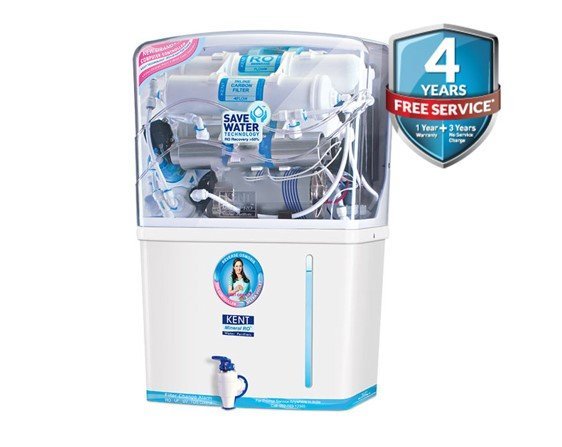Staying hydrated is essential for good health, but the quality of the water you drink is just as important as the quantity. Contaminated water, even from municipal or borewell sources, can contain harmful bacteria, viruses, and parasites. These invisible contaminants can lead to a wide range of waterborne diseases, affecting your family’s well-being. Understanding these risks is the first step toward protecting yourself from serious health issues.
Common Gut Infections from Unsafe Water
One of the most immediate effects of drinking contaminated water is an infection of your digestive system. Diseases like diarrhoea and gastroenteritis are common signs that you have consumed something harmful.
Diarrhoea is a symptom of an intestinal infection caused by bacteria, viruses, or parasites found in unclean food or water. It leads to the loss of essential fluids and salts from your body. If diarrhoea continues for several days, it can cause severe dehydration, which can be life-threatening if not treated promptly.
Gastroenteritis, often called the stomach flu, is an inflammation of the intestinal lining. It is also caused by microorganisms in drinking water. This condition can bring on a combination of uncomfortable symptoms, making it difficult to go about your daily life.
The Threat of Severe Bacterial Diseases
Certain bacteria present in contaminated water can cause severe and sometimes fatal diseases. Cholera and Typhoid are two of the most dangerous examples, known for their rapid and intense symptoms.
Cholera is caused by the bacterium Vibrio cholerae. While many cases are mild, it can cause profuse watery diarrhoea that quickly leads to severe dehydration and shock. Without treatment, death can occur within hours.
Typhoid fever is another life-threatening illness caused by bacteria spread through contaminated water. It is highly contagious and its symptoms progress over time, starting with fever and escalating to more serious issues. The increasing pollution of rivers and lakes has made typhoid a persistent threat in many areas.
Here is a quick comparison of these two bacterial diseases:
| Disease | Caused By | Primary Symptoms | Key Danger |
|---|---|---|---|
| Cholera | Vibrio cholerae bacteria | Severe watery diarrhoea, vomiting | Rapid and severe dehydration |
| Typhoid | Salmonella Typhi bacteria | High fever, abdominal pain, skin rashes | Intestinal complications, high fever |
Parasites that Weaken Your Immune System
It’s not just bacteria you need to worry about. Microscopic parasites can also thrive in untreated water, leading to infections that are particularly hard on the body. One such disease is Cryptosporidium Enteritis.
This parasitic infection targets the small intestine and is caused by consuming water contaminated with Cryptosporidium parasites. This disease is especially dangerous for individuals with compromised immune systems, such as young children, senior citizens, or people with chronic illnesses. A healthy person might recover, but for the vulnerable, it can be a very serious condition.
Symptoms of Cryptosporidium Enteritis often include:
- Watery diarrhoea
- Stomach cramps or pain
- Nausea and vomiting
- Fever
Because the parasite is resistant to chlorine, it can sometimes survive standard water treatment processes, making additional purification necessary.
How Contaminated Water Affects Your Liver and Overall Health
The risks of drinking impure water extend beyond your digestive tract. Some contaminants can cause systemic problems, affecting organs like the liver. Hepatitis is a prime example of a serious illness that can be contracted from contaminated water.
Hepatitis A is a viral infection that causes liver inflammation and is commonly spread through contaminated food or water. Millions of germs can enter your body, leading to noticeable and debilitating symptoms. These signs indicate that your liver is not functioning properly and requires immediate medical attention.
Some of the key symptoms of Hepatitis include jaundice (yellowing of the skin and eyes), dark urine, fatigue, nausea, and abdominal pain. While Hepatitis A is often an acute, short-term illness, it can be severe.
The Link Between Dirty Water and Food Poisoning
Many people associate food poisoning only with spoiled food, but the water used to prepare it plays a huge role. Using contaminated water for washing vegetables, cooking, or even making ice can introduce harmful bacteria into your meals.
This is because the same harmful organisms that cause waterborne diseases are also responsible for many cases of food poisoning. Even if you cook your food thoroughly, contamination can happen when you wash fresh produce like salads with unsafe water. The symptoms are often similar to other gut infections, including stomach pain, nausea, and vomiting.
How to Protect Your Family from Waterborne Diseases
Given the wide range of health risks, taking proactive steps to ensure your water is safe is crucial. Relying on tap water alone may not be enough, as contaminants can enter the water supply at various points.
The most effective way to protect your family is to use a reliable water purifier. Modern purifiers are designed to remove a wide spectrum of contaminants, including bacteria, viruses, parasites, heavy metals, and chemicals. Using purified water for both drinking and cooking is the best defence against these invisible threats.
Other important preventive measures include:
- Always washing your hands with soap and clean water before eating or preparing food.
- Boiling your water for at least one minute if you do not have a purifier, especially during outbreaks of waterborne diseases.
- Ensuring that water storage containers are clean and covered.
By making clean water a priority, you can safeguard the health of your entire family and avoid the dangers of these life-threatening diseases.
Frequently Asked Questions
What is the most common disease caused by contaminated water?
Diarrhoea is the most common illness linked to contaminated water worldwide. It is a leading cause of sickness and death, especially among young children who are more vulnerable to dehydration.
How do I know if my water is contaminated?
Unfortunately, you often cannot tell if water is contaminated just by looking at it, tasting it, or smelling it. Harmful microorganisms are invisible, so the only certain way to know is through professional water testing or by using a certified water purifier.
What are the first signs of a waterborne illness?
The first signs usually involve the digestive system. Symptoms like stomach cramps, nausea, vomiting, and diarrhoea often appear within hours or days of consuming contaminated water or food.
Is boiling water enough to make it safe?
Boiling water is a very effective method for killing bacteria, viruses, and parasites. However, it does not remove chemical contaminants, heavy metals, or impurities that affect the taste and smell of water.
Why is a water purifier important for my home?
A water purifier provides a reliable, multi-layered defence against a wide range of contaminants. It consistently delivers safe and clean water for drinking and cooking, protecting your family from both microbiological and chemical threats found in tap or borewell water.







Leave a Comment